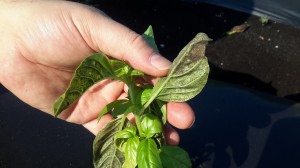Nursery and Landscape Pest Scouting Guide 150-250 GDD50:
Please print or download these resources (click on them):
- Printable Nursery Pest Scouting 150-250 GDD
- Expanded Nursery Pest Scouting Guide 150-250 GDD with CLICKABLE LINKS
- (Zoom in and click directly on the links within this document)
- Compiled Nursery and Landscape Pest Scouting 0-250 GDD (Printable)
Remember:
- To determine your local growing degree-days, please review this post “Obtaining your local growing degree-day information”
- The information provided in the downloads gives scouting GDD50 ranges (in growing degree days, base 50F) for specific insect pests harming nursery crop production and maintenance. It is important to note that these GDD50 are not exact, rather provide a range of GDD and subsequent calendar dates that can be used to scout for, and treat for, insect pests.
- This document supports scouting, it does not replace it. Keeping good notes on pest development will help dial in scouting and treatment efforts at your local level.
- Forecasting predictions (GDD50 accumulation) for calendar dates of multiple regions of New Jersey (S,N,C) are provided.
- If you need more information, OR you are regularly seeing specific pest development stages at growing degree-days different than those listed here, please contact Tim Waller at twaller@njaes.rutgers.edu
GREAT RESOURCE from Steve Rettke: “Landscape Pest Notes: Some Early Spring Insects/Mites”
| Projected GDD50 accumulation as of 4/15/2021 | |||||||
| Region | Location | 4/15/21 | 1-Apr | 1-May | 1-Jun | 1-Jul | Aug. 1st |
| Southern | Upper Deerfield (NJ50) | 141 | 75 | 230 | 636 | 1314 | 2156 |
| Central | Howell / Freehold (NJ10) | 94 | 67 | 165 | 513 | 1135 | 1929 |
| Northern | High Point (NJ59) | 50 | 21 | 56 | 268 | 721 | 1327 |
| Forecast: NOAA NCEP Coupled Forecast System model version 2 (CFSv2) forecast system (3.5 months) (USPEST.ORG) | |||||||
| Pest Scouting – Growing Degree-day Ranges | (150-250 GDD50) | |||||
| CROP TYPE | Common Name | Scientific Name | GDD Min (50F) | GDD Max (95F) | Reference | Developmental / Target Stage |
| Malus, Prunus, many | Eastern tent caterpillar | Malacosoma americanum | 90 | 190 | 2 | Larvae treatment before tents apparent (near 150-GDD50) |
| Elm, Service berry | Woolly elm aphid | Eriosoma americana | 121 | 246 | 2 (6) | Control target |
| Conifer | Hemlock woolly adelgid | Adelges tsugae | 150 | 150 | RU | Eggs and 10% hatch |
| Conifer | Spruce spider mite | Oligonychus ununguis | 150 | 175 | 4 | 1st egg hatch |
| Conifer | Spruce needleminer | Endothenia albolineana | 150 | 200 | 4 | 1st larvae active |
| Conifer | Balsam gall midge | Paradiplosis tumifex | 150 | 300 | 4 | Adults laying eggs |
| Witchhazel, River birch | Spiny witchhazel gall aphid | Hamamelistes spinosus | 171 | – | 6 | Control target |
| Birch | Birch leafminer | Fenusa pusilla | 190 | 290 | RU | Larvae (1st generation) |
| Conifer | Spruce spider mite | Oligonychus ununguis | 190 | 363 | RU | Immatures/Adults |
| Honeylocust | Honeylocust pod gall midge | Dasineura gleditchiae | 192 | 229 | RU | Larvae |
| Holly | Holly leafminer | Phytomyza ilicis | 192 | 290 | RU | Egg hatch |
| Holly | *Native holly leafminer | Phytomyza ilicicola | 192 | 298 | 2 | Egg hatch |
| Rhododendron | Rhododendron borer | Synanthedon rhododendri | 192 | 298 | 2 | Typical treatment window |
| Larch | Larch sawfly | Pristophora erichsonii | 192 | 299 | 2 | Typical treatment window |
| Andromeda | Andromeda lacebug | Stephanitis takeyai | 192 | 303 | RU | Adults |
| Rhododendron | Rhododendron gall midge | Clinodiplosis rhododendri | 192 | 363 | RU | Larvae |
| Willows, Cottonwood, Poplar | Imported willow leaf beetle | Plagiodera versicolora | 192 | 448 | RU | Larvae/Adults |
| Privet | Privet thrips | Dendrothrips ornatus | 192 | 618 | 2 | Typical treatment window |
| Lilac, ash, privet, many | Lilac / Ash Borer | Podosesia syringae | 200 | 299 | RU | Adults – 1st Treatment |
| Spruce | Spruce budworm | Choristoneura fumiferana | 200 | 300 | 5 | Larvae |
| Elm | Elm leafminer | Fenusa ulmi | 215 | 240 | 5 | Adult emergence |
| Wild and cultivated roses | Roseslug sawfly | Endelomyia aethiops | 230 | – | 6 | Egg hatch / early instars |
| Deciduous, many | Hawthorn lacebug | Corythucha cydoniae | 239 | 363 | RU | Nymphs/Adults |
| Conifer | Arborvitae leafminer | Argyresthia thuiella | 245 | 360 | RU | Larvae Treatments |
| Prunus | American plum borer | Euzophera semifuneralis | 245 | 440 | 5 | Adult flight, egg laying |
| Boxwood | Boxwood mites | Eurytetranychus buxi | 245 | 600 | RU | All Stages |
| Lilac | Lilac leafminer | Caloptilia syringella | 246 | 363 | 5 | Larvae Treatments |
| Holly | Holly leafminer | Phytomyza ilicis | 246 | 448 | RU | Larvae Treatment |
| Yew | Taxus mealybug | Dysmicoccus wistariae | 246 | 618 | RU | Adults/Crawlers |
| Conifer | Pine sawflies (Red-headed) | Neodiprion lecontei | 246 | 1388 | RU | Larvae (1st generation) |
| Boxwood | Boxwood leafminer | Monarthropalpusi flavus | 249 | – | 6 | Adult emergence |
| Conifer | Eastern spruce gall adelgid | Adelges abietis | 250 | 310 | 5 | egg hatch, galls begin forming (not a control target) |
| References | RU | Rutgers Cooperative Extension – IPM Notes | ||||
| 2 | http://ccetompkins.org/resources/using-growing-degree-days-for-insect-management | |||||
| 3 | https://extension.psu.edu/ipm-basics-for-christmas-trees#section-2 | |||||
| 4 | https://www.canr.msu.edu/ipm/agriculture/christmas_trees/gdd_of_conifer_insects | |||||
| 5 | https://www.agriculture.nh.gov/publications-forms/documents/landscape-pests.pdf | |||||
| 6 | https://extension.umd.edu/ipm/pest-predictive-calendar-landscapenursery | |||||
| 7 | https://www.canr.msu.edu/ipm/agriculture/christmas_trees/gdd_of_landscape_insects | |||||
Boxwood Blight risk-model information, considerations, and links:
| Boxwood Blight Risk Assessment as of 4/15/2021 | |||||||
| Region | Location | CODE | 15-April | 16-April | 17- April | 18-April | 19-April |
| Southern | Upper Deerfield | NJ50 | Low | Very Low | Very Low | Very Low | Very Low |
| Central | Howell / Freehold | NJ10 | Low | Very Low | Very Low | Very Low | Very Low |
| Northern | High Point | NJ59 | Very Low | Very Low | Very Low | Very Low | Very Low |
| Please check your local boxwood blight risk at (https://uspest.org/risk/boxwood_app) | |||||||
Considerations:
- These advisories are general in nature so someone from your business should be using this risk model (CLICK HERE) if boxwood is important to your financial stability. In 30 seconds you can have a better idea of boxwood blight (and other pathogen) activity in your immediate area!
- Treatment considerations and additional links (CLICK HERE)
Become a Boxwood Blight Advocate to receive quarterly updates (through the Horticultural Research Institution)


